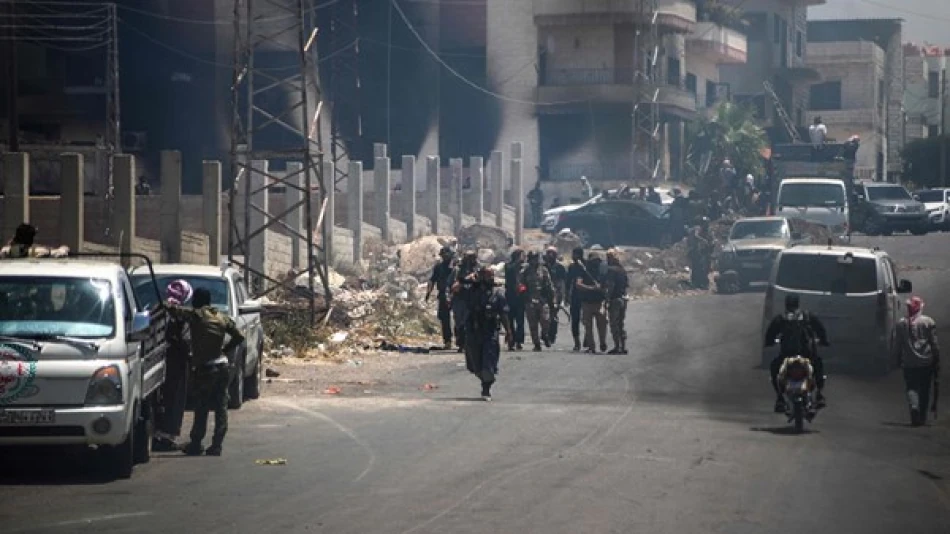
Tripartite Meeting Explores Ceasefire Consolidation in Sweida
Jordan, Syria, and US Broker Ceasefire Deal in Druze-Majority Suweida Province
A trilateral diplomatic intervention has secured an immediate ceasefire in Syria's southern Suweida province, where sectarian violence claimed over 700 lives in just one week. The agreement, brokered by Jordan's Foreign Minister Ayman Safadi, Syrian Foreign Minister Asaad al-Shaibani, and US Syria Envoy Tom Barak, represents a rare moment of US-Syrian cooperation and highlights Jordan's growing role as a regional mediator in Syria's complex post-conflict landscape.
Strategic Importance of Suweida Province
Suweida province holds particular significance as the heartland of Syria's Druze minority, a religious community that has historically maintained a delicate balance between supporting the Assad government and preserving its autonomy. The recent surge in violence—resulting in over 700 casualties within a single week—threatened to destabilize one of Syria's relatively peaceful regions and potentially reignite broader sectarian tensions across the country.
The province's location along Syria's southern border with Jordan makes any instability there a direct security concern for Amman, explaining Jordan's urgent diplomatic intervention. For Damascus, maintaining control over Suweida is crucial for demonstrating state authority across all Syrian territory, particularly in minority-populated areas.
Diplomatic Breakthrough Amid Regional Tensions
Practical Implementation Measures
The ceasefire agreement goes beyond a simple halt to hostilities. According to the Jordanian Foreign Ministry statement, the three parties agreed on concrete operational steps including the deployment of Syrian security forces throughout Suweida province, the release of detainees held by all parties, community reconciliation efforts, and the facilitation of humanitarian aid access.
This comprehensive approach suggests lessons learned from previous failed ceasefires in Syria, where vague agreements without implementation mechanisms quickly collapsed. The inclusion of prisoner releases and community reconciliation indicates an understanding that sustainable peace requires addressing underlying grievances, not just ending immediate violence.
Accountability and Justice Components
Notably, the Syrian government committed to holding accountable those responsible for violations against civilians in Suweida province. This represents a significant diplomatic concession, as Damascus has rarely acknowledged wrongdoing by its forces or allied militias during the broader Syrian conflict.
Jordan's Evolving Regional Role
Jordan's central role in brokering this agreement reflects its transformation from a passive observer to an active mediator in Syrian affairs. King Abdullah II's government has increasingly positioned itself as a bridge between the Assad government and Western powers, particularly as regional dynamics shift toward pragmatic engagement with Damascus.
This mediation success could enhance Jordan's regional standing and potentially attract international support for its own economic challenges. The kingdom has long argued that Syria's instability directly impacts Jordanian security and economic interests, making active engagement a strategic necessity rather than a policy choice.
Implications for US-Syria Relations
The participation of US Syria Envoy Tom Barak in direct talks with Syrian Foreign Minister al-Shaibani marks a notable development in Washington's approach to Damascus. While the US maintains comprehensive sanctions on Syria and refuses formal diplomatic recognition of the Assad government, this trilateral meeting suggests a willingness to engage on specific humanitarian and security issues.
This pragmatic approach may signal a broader shift in US policy, recognizing that complete isolation of Damascus has failed to produce desired political changes while potentially hindering efforts to address humanitarian crises and regional stability concerns.
Regional Stability Calculations
The swift international response to the Suweida violence reflects broader regional concerns about Syria's fragile stability. With ongoing Israeli strikes, Turkish operations in northern Syria, and Iranian influence throughout the country, any new source of instability risks triggering wider regional escalation.
The emphasis on "Syria's security and stability as a pillar of regional stability" in the joint statement underscores how neighboring countries increasingly view Syrian stabilization as essential to their own security interests, potentially creating new momentum for diplomatic solutions to remaining conflicts within Syria.
Most Viewed News

 Layla Al Mansoori
Layla Al Mansoori






